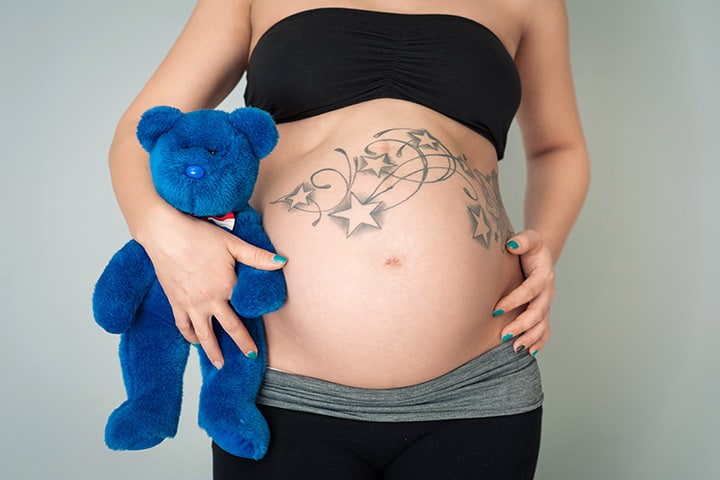As a first-time expectant mother, I was both excited and anxious about the idea of getting a tattoo to celebrate my pregnancy. My regular dermatologist, Dr. Sarah Mitchell, gave me valuable advice while I was planning my baby shower, helping me understand important things I hadn’t thought about.
- Understanding the Risks of Tattoos During Pregnancy
- Best Trimesters for Getting a Tattoo
- Changes in Skin Sensitivity During Pregnancy
- Tattooing and Breastfeeding: What You Need to Know
- Timing Your Tattoo After Birth: A Guide to Recovery and Healing
- Consultation with Healthcare Professionals: Ensuring Safety Throughout the Tattoo Journey
- Considering Epidurals, Back Tattoos, and Other Factors: Addressing Common Concerns
- Exploring Alternatives to Traditional Tattoos During Pregnancy: Henna, Temporary Tattoos, and More
During my conversation with Dr. Mitchell, I learned some surprising information about bloodborne infections like Hepatitis B. She mentioned a recent report from the Florida Department of Health that highlighted cases of acute hepatitis linked to unsafe tattooing practices during pregnancy. This information completely changed how I viewed what I initially thought would be a lovely way to honor motherhood.
Getting a tattoo while pregnant isn’t just about expressing yourself artistically – it’s a medical choice that needs careful thought. Through my research and discussions with medical professionals, I discovered:
- Potential risks for both mother and baby
- Changes in skin sensitivity during pregnancy
- Safety concerns related to tattoo inks
- Infection prevention protocols
This guide is based on my personal experiences and professional medical advice. Its purpose is to assist other expectant mothers in making informed choices about tattooing during pregnancy. I’ll share what I’ve learned about timing, safety measures, and alternatives that can safeguard both you and your developing baby.
Understanding the Risks of Tattoo During Pregnancy
During my first pregnancy, I was eager to get a commemorative tattoo. My dermatologist, Dr. Sarah Mitchell, helped me understand the potential risks. She explained that getting a tattoo while pregnant isn’t just about the immediate procedure – it’s about protecting both mother and baby from various health concerns.
Infection Risks
My consultation revealed several infection-related concerns:
- Bacterial Infections: The tattooing process creates tiny wounds in the skin, making them susceptible to bacterial infections
- Bloodborne Diseases: Risk of contracting hepatitis B, hepatitis C, or HIV from unsterile equipment
- Skin Infections: Higher susceptibility to infections during pregnancy due to a temporarily compromised immune system
Allergic Reactions and Skin Sensitivity
The American Academy of Dermatology Association highlighted these potential reactions:
- Severe itching
- Redness and swelling
- Skin rashes
- Blistering
- Increased sensitivity due to pregnancy hormones
Toxic Components in Tattoo Inks
My dermatologist shared concerning information about tattoo inks:
“Many tattoo inks contain heavy metals like mercury, lead, and arsenic. These substances could potentially cross the placental barrier and affect fetal development.”
Impact on Diagnostic Procedures
During my research, I discovered that tattoos might interfere with:
- Skin examinations during pregnancy
- Detection of skin changes that could indicate pregnancy-related conditions
- Medical imaging procedures
Safety of Tattoo Inks
The FDA hasn’t approved any tattoo inks for injection into the skin, and research about their effects during pregnancy remains limited. My dermatologist emphasized that some inks contain:
- Metal-based pigments
- Industrial-grade colorants
- Organic dyes
- Unknown chemical compounds
When I discussed this with my tattoo artist, they confirmed these concerns and recommended waiting until after pregnancy. They explained that reputable artists often decline to tattoo pregnant women due to these risks.
The decision to get a tattoo during pregnancy requires careful consideration of these potential risks. After my consultation, I chose to postpone my tattoo plans until after delivery, prioritizing my baby
Best Trimesters for Getting a Tattoo
During my pregnancy journey, I had an in-depth discussion with my dermatologist about the safest timing for getting a tattoo. Here’s what I learned about each trimester:
First Trimester Considerations
- My doctor strongly advised against getting tattoos during this critical period
- The risk of miscarriage is highest during these initial weeks
- Morning sickness and fatigue can compromise the healing process
- The body’s immune system is naturally suppressed, increasing infection risks
- Additionally, many women experience sleep disturbances during the first trimester, which could further complicate recovery
Second Trimester Advantages
- My dermatologist identified this as the potentially safest period
- Morning sickness typically subsides
- Energy levels are higher
- The immune system is more stable
- The belly hasn’t expanded significantly yet
- Skin sensitivity is generally more manageable
Third Trimester Precautions
- Physical discomfort makes it challenging to sit for long periods
- Stretched skin can affect tattoo appearance
- The body retains more water, potentially distorting the tattoo
- Increased blood flow might cause excessive bleeding during the process
- Risk of premature labor if the body experiences stress
My dermatologist emphasized that while the second trimester presents fewer complications, she still recommended waiting until after pregnancy. During my second trimester, I noticed my skin had become more elastic and sensitive – conditions that could affect tattoo healing and appearance.
The medical team also pointed out that each pregnancy is unique. What might work for one person could be risky for another. They suggested documenting any skin changes throughout the pregnancy and discussing these with both the dermatologist and potential tattoo artist.
A crucial point my doctor stressed was that any signs of infection or adverse reaction during pregnancy require immediate medical attention, regardless of the trimester. The standard healing time of 2-3 weeks could also be extended during pregnancy due to the body’s altered state.
Changes in Skin Sensitivity During Pregnancy

During my pregnancy journey, I noticed significant changes in my skin that made me reconsider my tattoo plans. My dermatologist explained that pregnancy hormones trigger various skin transformations, affecting how tattoos might heal and appear. This aligns with findings from a comprehensive review on pregnancy dermatoses which highlights the common skin changes experienced during this period.
How My Skin Changed
My skin became:
- Hypersensitive to touch and pressure
- More elastic to accommodate my growing belly
- Prone to discoloration and melasma
- Increasingly itchy due to stretching
The American Pregnancy Association confirms these changes are normal, but they can impact tattoo healing. When I touched my existing tattoo, I noticed the skin felt different – more reactive and tender than before.
Also Read: Can I Slap My Tattoo If It Itches?
Potential Skin Conditions During Pregnancy
My dermatologist pointed out that pregnancy can cause temporary skin conditions like pruritic urticarial papules and plaques of pregnancy (PUPPP) which might interfere with tattoo healing. These conditions are part of the broader spectrum of changes discussed in the aforementioned review.
Concerns About Stretching Skin
The stretching of skin during pregnancy particularly concerned me. Areas like the stomach, breasts, and hips expand significantly, potentially distorting new tattoos. My friend’s belly tattoo, done early in pregnancy, stretched noticeably by her third trimester.
Impact on Existing Tattoos
These skin changes don’t just affect new tattoos – existing ones might look different too. Some women report their tattoos appearing blotchy or faded during pregnancy, though many return to normal postpartum. My dermatologist advised waiting until after pregnancy when my skin returns to its normal state before getting any new ink.
Tattooing and Breastfeeding: What You Need to Know
During my breastfeeding journey, I consulted my dermatologist about getting a tattoo, and her insights were eye-opening. She explained that while breastfeeding doesn’t directly affect tattoo healing, there are specific considerations I needed to understand.
Key Safety Points My Dermatologist Emphasized:
- The body needs extra energy to heal a tattoo while producing milk
- Risk of infection could affect milk supply
- Some tattoo inks might contain harmful substances that could pass through breast milk
My doctor advised waiting at least 3-4 months after starting breastfeeding before considering a tattoo. This allows the body to establish a stable milk supply and recover from childbirth.
Location Matters
I learned that tattoo placement requires careful thought during breastfeeding:
- Avoid areas near breasts or commonly touched during nursing
- Consider that the baby might grab or scratch the tattoo
- Select spots that won’t stretch as your body continues to change
Infection Prevention
My dermatologist stressed these essential precautions:
- Choose a licensed tattoo artist experienced with postpartum clients
- Maintain strict hygiene practices
- Watch for signs of infection that could impact milk production
- Keep the tattoo covered during nursing sessions
I appreciated my doctor’s reminder that while getting a tattoo during breastfeeding isn’t strictly prohibited, waiting until after the nursing journey might be the safest choice.
Timing Your Tattoo After Birth: A Guide to Recovery and Healing
After giving birth to my beautiful daughter, I was eager to get back to my regular activities – including getting that tattoo I’d been planning. My dermatologist advised me to wait at least 6-12 months post-delivery before considering any tattoo work.
Here’s what I learned about the ideal timing for post-birth tattooing:
- Physical Recovery First: My body needed time to heal from childbirth. The dermatologist explained that hormone levels take 3-6 months to stabilize.
- Weight Stabilization: I waited until my weight settled to its new normal – around 8 months postpartum. This prevented potential tattoo distortion.
- Skin Elasticity: My skin needed time to regain its pre-pregnancy firmness. The doctor recommended waiting until my skin had fully recovered its elasticity.
- Immune System: The specialist emphasized that my immune system needed to be at its strongest to handle the tattoo healing process effectively.
My Personal Timeline:
- 0-6 months: Focused on postpartum recovery
- 6-8 months: Started researching tattoo artists
- 9 months: Consulted with my dermatologist for final approval
- 10 months: Scheduled my tattoo appointment
The waiting period felt long, but it ensured my body was ready for the tattoo healing process. My dermatologist’s guidance helped me make an informed decision about the right time to get inked.
Consultation with Healthcare Professionals: Ensuring Safety Throughout the Tattoo Journey
During my pregnancy journey, consulting with my healthcare providers proved invaluable when considering getting a tattoo. My dermatologist, Dr. Sarah Chen, emphasized the importance of professional medical guidance before making any decisions about body modifications during pregnancy.
Here’s what I learned from my medical consultations:
- Pre-tattoo Health Assessment: My doctor conducted a thorough evaluation of my skin condition and overall health status to determine if I was a suitable candidate for tattooing.
- Blood Test Requirements: They recommended specific blood tests to check for any underlying conditions that could increase infection risks.
- Documentation Review: My healthcare team reviewed my medical history, including:
- Previous allergic reactions
- Skin sensitivities
- Pregnancy complications
- Current medications
My obstetrician provided specific guidance about:
- Safe timing windows for getting tattooed
- Potential complications based on my individual pregnancy progress
- Recommended tattoo locations that wouldn’t interfere with medical procedures
The medical team also helped me create a safety plan, including:
- A list of reputable tattoo artists who work with pregnant women
- Warning signs to watch for post-procedure
- Emergency contact information
I’m grateful for scheduling these consultations – they helped me make an informed decision based on my specific health circumstances rather than relying on general advice from the internet.
Considering Epidurals, Back Tattoos, and Other Factors: Addressing Common Concerns
During my pregnancy journey, one of my biggest concerns was whether my existing lower back tattoo would affect my ability to receive an epidural during labor. My dermatologist and anesthesiologist provided valuable insights that I’m eager to share.
The Truth About Lower Back Tattoos and Epidurals
My medical team explained that while lower back tattoos don’t automatically rule out epidural anesthesia, they require careful consideration:
- Anesthesiologists typically avoid inserting the epidural needle through tattooed areas
- Fresh tattoos (less than 6 months old) pose higher risks of complications
- Well-healed tattoos rarely cause problems with epidural placement
My Personal Experience
I had my lower back tattoo for three years before pregnancy, and my anesthesiologist found an un-inked spot for the epidural. She explained that modern epidural techniques allow for precise placement, working around existing tattoos.
Additional Considerations
My dermatologist highlighted other important factors:
- Skin stretching can affect tattoo appearance
- Certain body areas experience significant changes during pregnancy
- Some tattoo locations may interfere with medical procedures
Based on professional advice, I learned that the safest approach is planning tattoo placement with future medical procedures in mind. My healthcare team recommended avoiding the lower back area entirely if considering future pregnancies.
An interesting aspect I discovered during this journey is the potential impact of tattoos on the body’s microbiome. This is something worth considering when thinking about tattoo placements in relation to health and medical procedures.
Exploring Alternatives to Traditional Tattoos During Pregnancy: Henna, Temporary Tattoos, and More
During my pregnancy journey, I discovered several beautiful alternatives to permanent tattoos that allowed me to express myself safely. After consulting with my dermatologist, Dr. Sarah Mitchell, she recommended exploring non-permanent options.
Natural Henna Art
My favorite discovery was natural henna. Dr. Mitchell explained that pure, organic henna paste is plant-based and safe during pregnancy. I found an experienced henna artist who:
- Used fresh, natural henna paste
- Mixed ingredients in front of me
- Provided ingredient documentation
- Avoided synthetic additives
Temporary Tattoo Options
I also tried FDA-approved temporary tattoos. These lasted 3-5 days and satisfied my creative urges. My dermatologist advised checking for:
- Skin-safe adhesives
- Non-toxic, pregnancy-safe dyes
- Clear ingredient listings
- Patch test before full application
Safety First
I learned to avoid black henna completely – it contains PPD, which can cause severe reactions. My dermatologist emphasized reading labels carefully and choosing products specifically marked as pregnancy-safe.
Application Tips
Through trial and error, I discovered these temporary body art options worked best on:
- Upper arms
- Shoulders
- Ankles
- Wrists
These alternatives gave me the freedom to experiment with different designs throughout my pregnancy without compromising my baby’s safety.
FAQs About Getting a Tattoo While Pregnant or Breastfeeding (And Expert Answers)
During my pregnancy journey, I consulted extensively with my dermatologist, Dr. Sarah Chen, who provided expert answers to these common questions about tattoos during pregnancy and breastfeeding
“I advise against tattoo touch-ups during pregnancy. Your skin’s sensitivity changes dramatically, and healing might be compromised. Wait until at least 6 months postpartum for the best results.” – Dr. Chen
“Your body needs time to recover. I recommend waiting at least 6-9 months post-delivery. This allows your hormone levels to stabilize and your skin to return to its normal state.”
Based on my consultation, the answer is complex. Dr. Chen explained that while there’s no direct evidence of ink affecting breast milk, the risks of infection during healing could require antibiotics that might impact breastfeeding.
From my personal experience, tattoos on my hips and lower abdomen did stretch. Dr. Chen confirmed this is normal and varies by:
Location of the tattoo
Skin elasticity
Weight gain during pregnancy
Dr. Chen connected me with an anesthesiologist who explained that while fully healed back tattoos rarely cause issues, fresh tattoos could complicate epidural placement.




